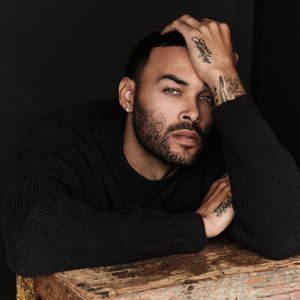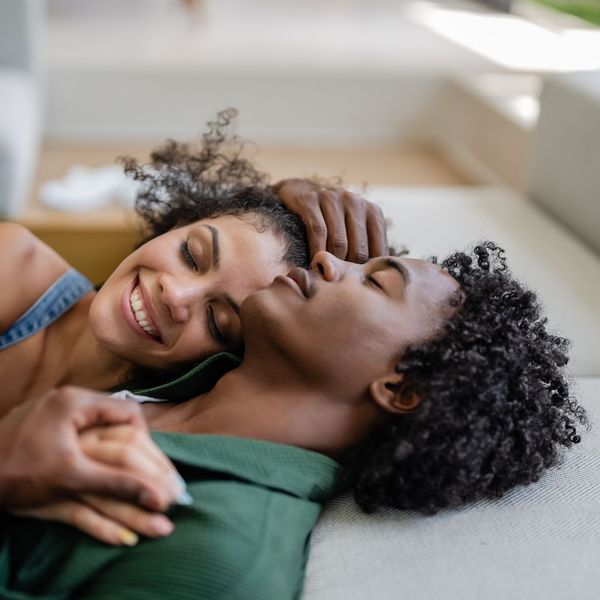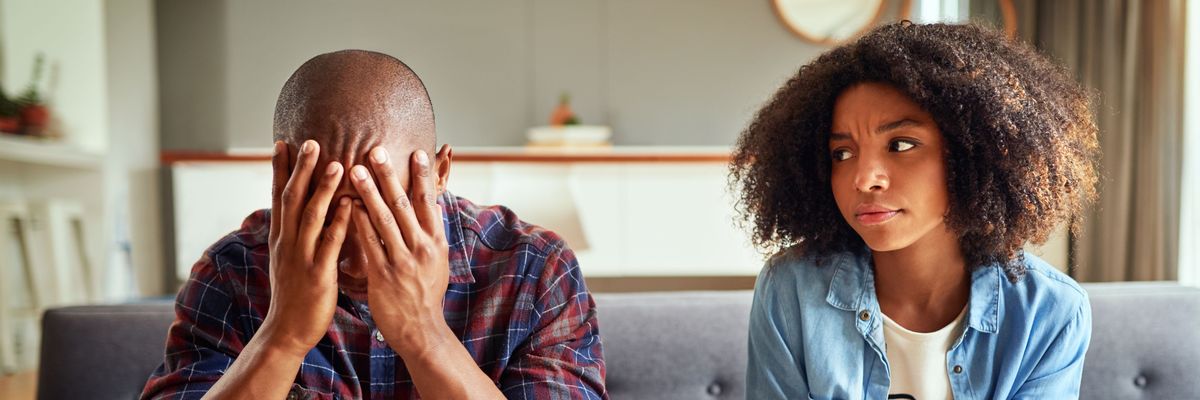
While I’m the first to encourage my fellow African-Americans to spread them transatlantic wings to hop across the pond and join me in Europe, there’s a part that I’m always hesitant to open up about when it comes to the reality of our existence in some parts of the world.
And while I can’t speak for every black woman, nor every country’s views, I can share my experiences, my observations, and my discoveries, in hopes that it can prepare and even educate fellow black women as to something that is far too common, and yet, beyond our control.
Sorry to build the suspense, but I have to contextualize this, because again, I was so oblivious to it at first, that when it happened, I was so shocked, disgusted, and confused. And a bit saddened as well.
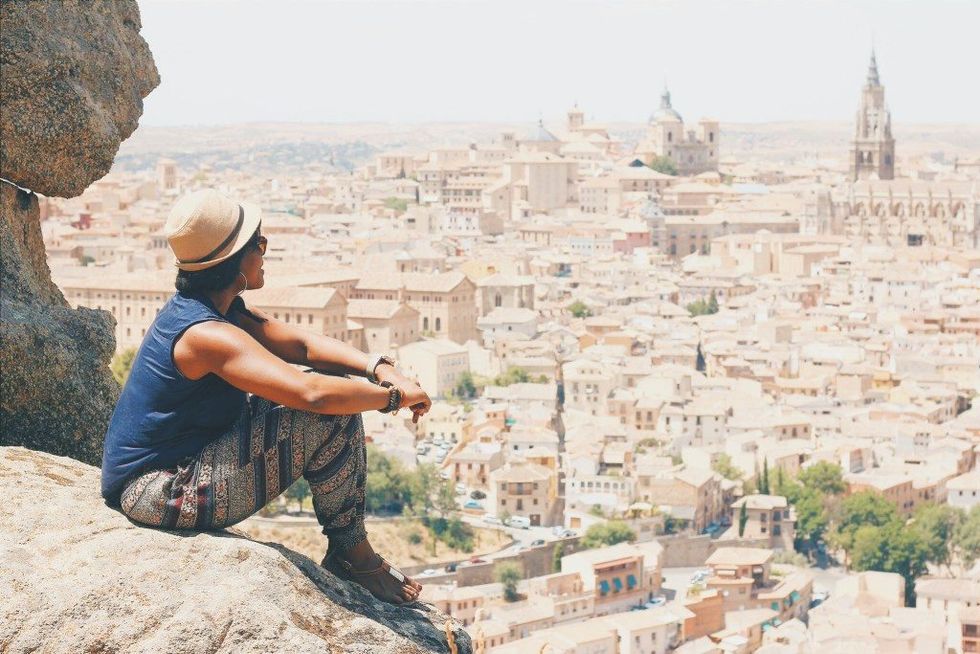
Because when you’re so used to doing everything to control the perception others have of you, and then having that “power” taken away from you for the simple fact that you’re in a city or region where people that have your skin color, are usually prostitutes, it’s a hard pill to swallow. Yes, that’s right.
I was mistaken for a prostitute.
Not just once. But dozens of times. And I’ve honestly lost count.
The first time it happened, I was in Spain.
The second time, The Czech Republic.
The third time, Albania.
And before the cynics begin to question what I was wearing, it didn’t matter. I was clothed, covered, and respectable. Whether that be in a long, flowing skirt or in jeans and a peacoat, there are just some regions of the world who see black skin on a woman, and assume that the only way I was able to afford to get there and stay there, was by way of selling my body to a local. This way of thinking isn’t born overnight. It’s taught and it’s engrained by what’s happened in the past.
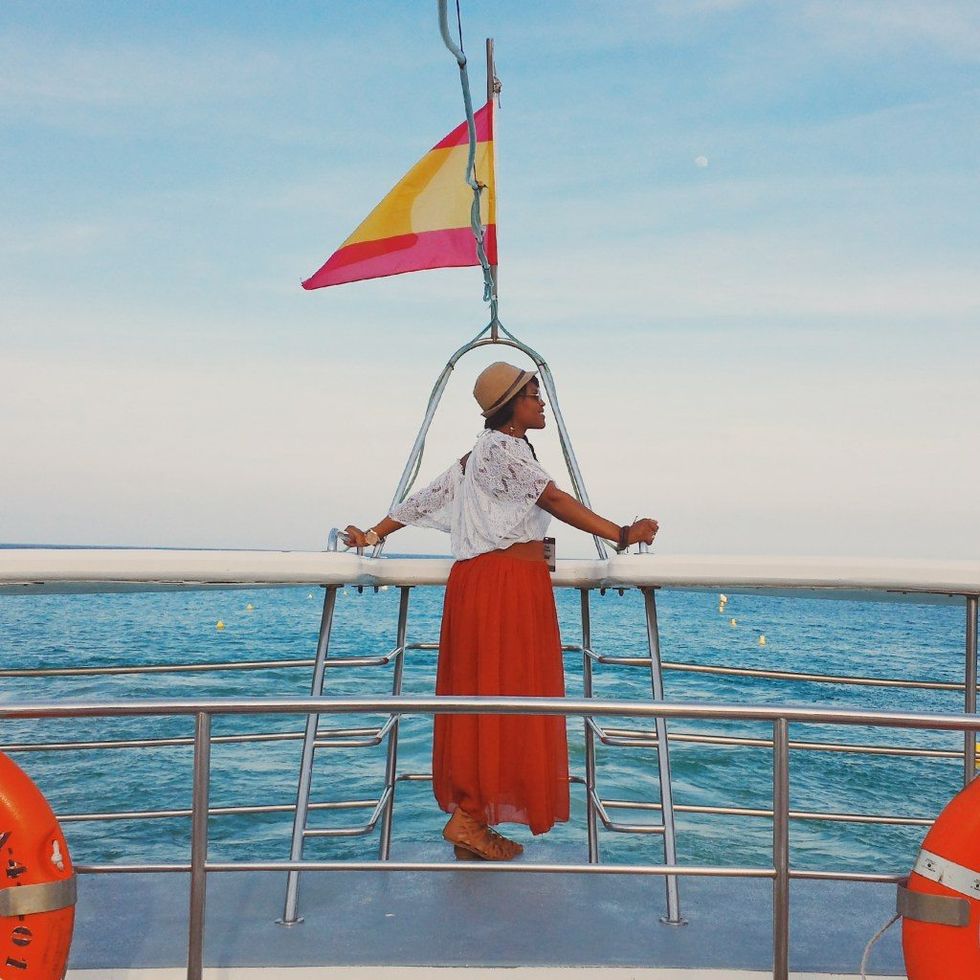
In Barcelona, my favorite city in Europe (and that’s extremely biased as I got to call it home for a year), I soon learned that there were certain streets I just couldn’t walk down at a certain hour, even as “early” as 8PM.
One time I was with my German friend leaving a restaurant, and he was walking me back to the train station on the famous La Rambla street, and one by one we’re met with these strange looks that I can’t quite describe. It was a mix between a look of congratulations to my friend and a look of dirtiness to me. We pass police officers who mutter something along the lines of “good job” in Catalan, while looking towards my German friend, and seemingly scaling me up and down as if imagining what Nicki Minaj moves I had in my repertoire. My friend and I look at each other, mutually sensing the discomfort of the situation, but still wondering why we were attracting such strange expressions. And this was one of my closest friends while in Barcelona, strictly platonic, and now incredibly awkward.
I start becoming self-conscious and more observant of everyone around us, wondering why we were getting so much attention. And then I lock eyes with what looked like a West-African (specifically, Nigerian) woman. She stares me up and down, then looks at my German friend, eyeballs his crotch area, then looks at me again and mutters something to her friend nearby. It’s now clear they were prostitutes, and they’ve mistaken me as their “competition” and crossing into their territory. By now, we’ve made our way off the main strip of La Rambla, and off to the smaller sidewalk, because the attention became too much.
And then we notice a trend. Every 100 feet or so, there’s a new African woman, claiming her spot/corner and giving me the same “jealous” glare as if they’re mad I had found a “customer” for the night, while they were still out there harassing every man that passed them by. The worst part is, they did look like me. And I looked like them.
You see, most African prostitutes in Europe don’t exactly dress like prostitutes do. They wear coats, scarves, sweaters, and jeans. Just like me. Therefore, making us almost indistinguishable. I was an empty corner away from looking like one of them, and the embarrassment was enough to keep me away from that street past dark for the remainder of my time in Barcelona.
I tried hard to forget about that night, and my friend and I only talked about it once over coffee, before agreeing to pretend it never happened. It was awkward. To have a friend walk down a street for 15 minutes under the assumption that you, his good friend, was purchased for the night. I don’t walk around flashing my college degree, credentials, or achievements on my arms, but the fact that I couldn’t and didn’t really know how to defend myself, was something new. I was embarrassed. A type of embarrassed that leaves you speechless and unsure how to vent or open up about it with friends.
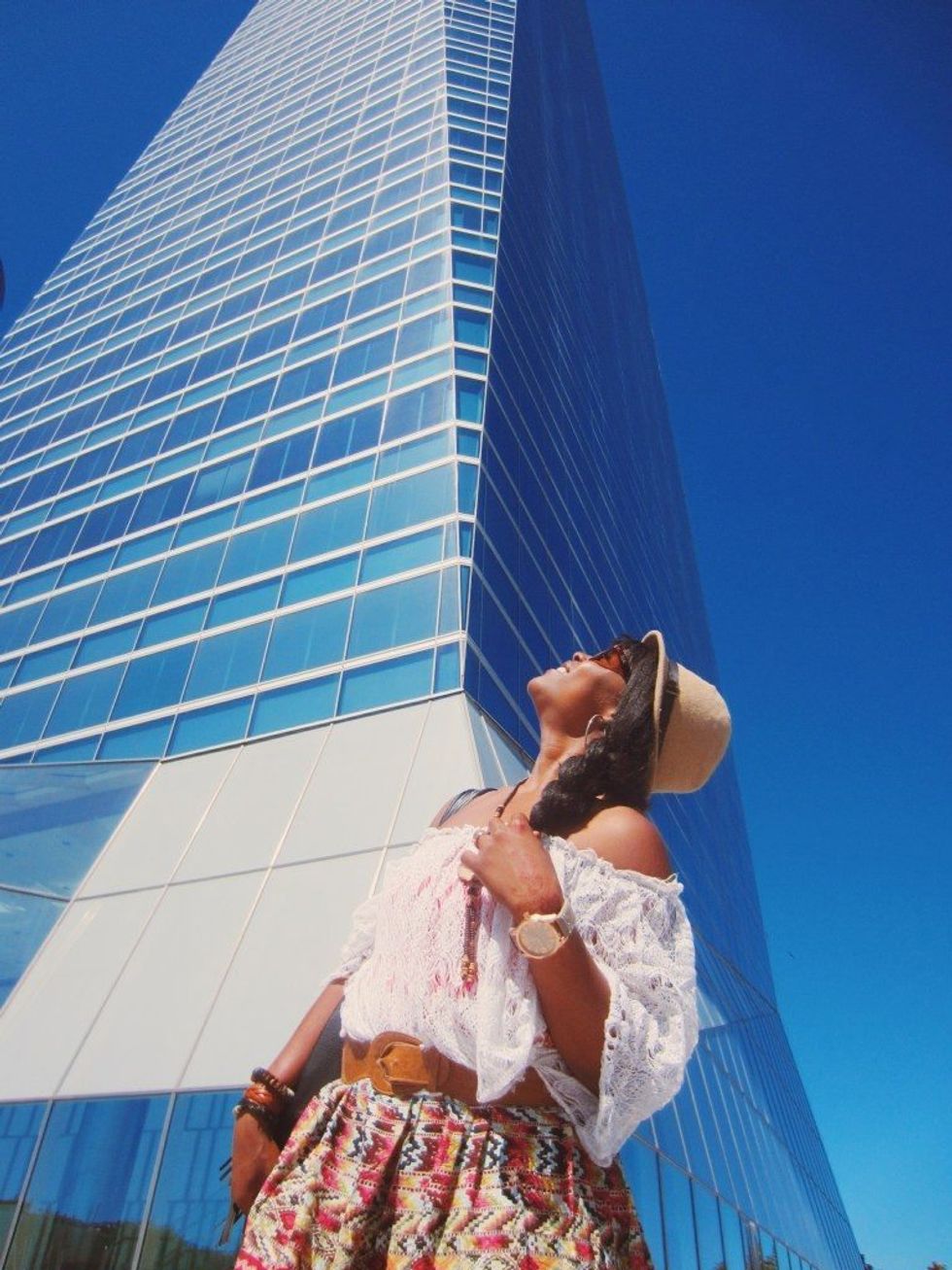
Another time while I was out and about exploring the city, I arrive at a small intersection where I see a car coming.When I’m in no hurry, I’m always very laxed about letting cars just go in front of me, and depending on where you are, most of them do anyway. But I see him slowing down, and encourage him to press the gas again, and do a motion with my hand that waves him through to carry onwards. But he instead brakes even harder so that his passenger window is right in front of me, winds down his window, and excitedly asks me in Spanish how much I charge, soon motioning that he didn’t even care, to just hop in the car anyway, reaching over to open the door.
The shock hit me so hard again, I felt like someone just punched my gut. I *accidentally* kicked his car and walked around him and crossed the street. My Spanish/Catalan was so bad at that time, that I hadn’t taught myself how to be angry in a foreign language yet. And God knows that was probably for the best. Jesus took that wheel.
And as much as I try to forget it happened. It soon happened again in Seville, Spain. And then in Prague, Czech Republic, and then in Gjirokastra, Albania. And several other cities, towns, and villages around Europe. And being here now in Cyprus, I was reminded yet again, that this is just a part of my solo travel experience that I have to accept. Because it’s happened again.

The other day I met a lovely lady from The Philippines who’s the pastor of a church here who told me about their worship service happening in a few minutes. She wanted to prepare a few things and had her husband walk me to where the church was located.
Sidenote: After traveling for so long, you start to develop a spirit of discernment, and I knew from the sound of their voices and the joy in their heart from finding a “sister in Christ” that I was in good hands.
So her husband and I start walking down the main street and heading for the church. He was probably in his early 60’s, and since the wife was off picking up some things, there we were. An older man, with a 20-something old black woman, and immediately, the heads are turning, I’m hearing mutters, and on this narrow street lined with bars and restaurants of hundreds of people sitting outside facing towards the street, we soon become the center of attention. And by the looks of their faces, it was not for anything good.
There is nothing more embarrassing than the thought of someone thinking you were just “purchased”.
I knew what everyone thought, and my jolly new friend, oblivious to it all, is telling me about his journey of being a born again Christian, and how much God has worked miracles in his life. And there I was, instead of rejoicing with him in his victories, allowing my human side to take over, and I put my head down, trying to avoid all the stares and mutters we were receiving. It was different than the stares I got when I was by myself exploring Cyprus. People smiled and waved, and even chimed in a few times with, Welcome to Cyprus! It was beautiful. But it was about 8PM this time. And all I saw were judgmental faces.
We soon arrived to the church and I’m greeted by a cheerful group of Filipinos, Sri Lankans, and Africans who are so delighted to see a new face in their church. But the walk I made to get there was too much for me to handle at the time, and I was still trying to process it all. I honestly just wanted to break down and cry and run back to the comforts and confinements of my hotel. I wasn’t in the mood to serve or sing, although that was probably the exact type of environment I needed to be in, but I was tired of going through that same worthless strut that had followed me in far too many cities around Europe.
But writing is my form of healing. And just like my Prague experience, I’m slowly but surely teaching myself that I simply cannot control others’ perceptions of me. Despite my accomplishments, despite my education, despite what I’ve overcome to get where I am today, if they’re accustomed to associating my skin color with those of prostitutes, then I simply can’t let that get to me.
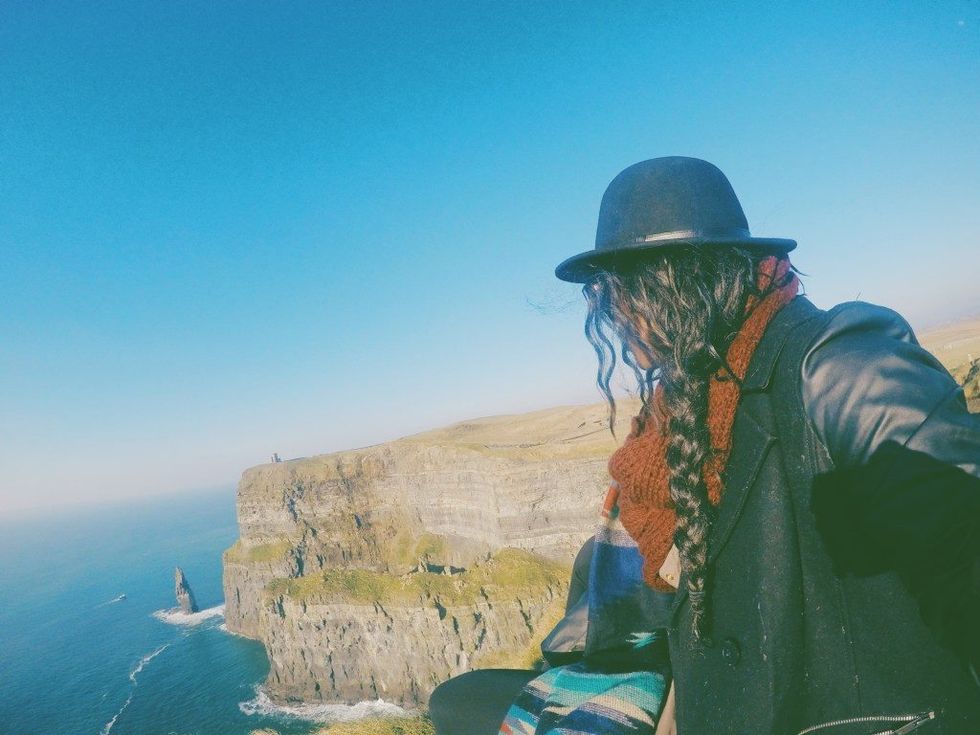
Their ignorance is NOT my problem.
So while I want nothing more than my fellow African-American women to go out and explore this beautiful world around us, on their own if they can, please do be prepared and aware that this might be your experience too.
I’ve been traveling around Europe cumulatively for almost 1,000 days since 2012, and that’s been filled with beautiful encounters, cultural exchanges, and inspiring conversations.
So these moments definitely make up the minority of my experience. And it’s important to remember that while we can’t change the perception of black women in these countries overnight, we can do our best to increase our presence, as everyday tourists, worthy of respect and not lazy assumptions about how we afforded to get there in the first place.
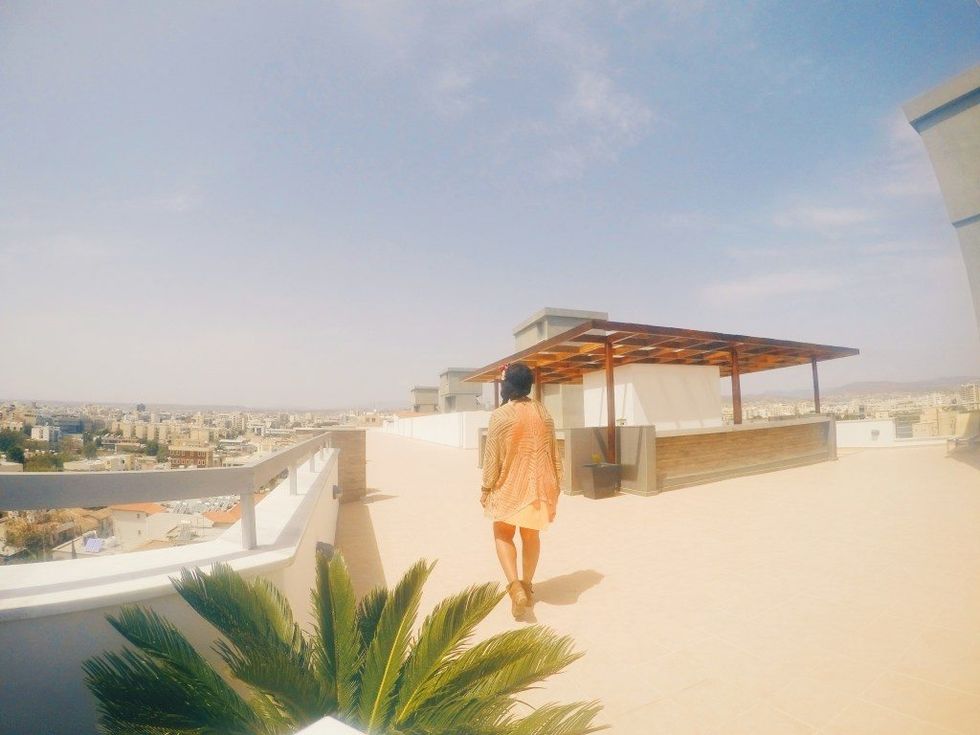
And know that these problems aren’t exclusive to these cities and countries, nor is the prostitution label exclusive to black women, because it really depends on the history of foreign women in that area.
And if a fellow African-American female traveler went abroad for the first time and experienced this, I can at least feel good about letting her know that she is not alone and it’s completely out of her control.
So while I wrote this as more of a therapeutic way for me to cope, I also hope it enlightened some of you all too.
Thanks for listening.
Originally posted on The Blog Abroad.
Gloria Atanmo is an American Travel Blogger and Digital Storyteller at TheBlogAbroad.com where she recounts her experiences from traveling for over 1,000 days. With 30+ countries under her belt, she hopes to continue educating, empowering, and inspiring others to get out and explore the beautiful world around us.
This Is How To Keep 'Holiday Season Stress' From Infecting Your Relationship
Hmph. Maybe it’s just me, but it seems like there is something really weird happening in the fall season air (because winter doesn’t officially begin until December 21) that cuddle season is in full swing while break-up season is as well. In fact, did you know that break-ups are so popular during the holiday season that December 11 is deemed Break-Up Day?
The reasons why relationships shift around this time vary; however, I did both roll my eyes and chuckle when I read that a very popular one is because it’s an easy way to get out of getting one’s significant other a Christmas present. SMDH.
Anyway, I personally think that the less shallow folks out here may contemplate calling things “quits” or they at least distance themselves a bit from their partner (and what I’m referring to is serious relationships) due to all of the stress and strain that oftentimes comes with the holidays whether it be financial, familial, due to their tight schedules or something else.
Listen, I would hate for you and your man to miss the fun and happiness of experiencing this time of year, all because you are so overwhelmed or irritated that you can’t really enjoy it. That’s why I have a few practical tips for how to avoid allowing the typical holiday season stress from INFECTING your relationship.
Manage Your Expectations
 Giphy
GiphyUnmanaged expectations. If there is a main reason why the holiday season tends to be so stress-filled for so many people, I’d bet good money that this is the cause. And when you’re in a long-term relationship, expectations can manifest themselves in all sorts of cryptic and/or unexpected ways. You might have relatives who assume that you are going to be with them for Thanksgiving or Christmas when you have other plans in mind. You might be thinking that you are going to spend one amount for presents while your man is thinking something totally different. When it comes to scheduling, your signals may be crossed.
And you know what? To all of these scenarios, this is where clear and consistent communication come in. Don’t assume anything. Don’t dictate anything either. From now until New Year’s, mutually decide to check in once a week, just to make sure that you are both on the same page as it relates to the holidays and what you both are thinking will come along with it. The less blindsided you both feel, the less stressed out you will be. Trust me on this.
Set (and Keep) a Budget
 Giphy
GiphyOkay, so I read that last year, 36 percent of Americans incurred some type of holiday-related debt. Hmph. Last year, there was still some sense of normalcy in this country, chile, so I can only imagine what finances are gonna look like over the next several weeks. That said, since I don’t know a lot of people who don’t find being broke stressful, make sure that you and your bae set a budget and then stick to it this year — no ifs, ands or buts.
Because really, y’all — it doesn’t make sense to deplete savings and/or max out credit cards for a few days of giggles only to be damn near losing your mind because you don’t know how to make ends meet come Dr. Martin Luther King, Jr. Day.
And by the way, this tip doesn’t just speak to things like food and gifts; I also mean travel. If it doesn’t make a ton of sense (or cents) to be all over the place this year — DON’T BE.
Keep Matthew 5:37 at the Forefront
 Giphy
GiphyIf off the top of your head, you don’t know what Matthew 5:37 says, no worries, here ya go: “But let your ‘Yes’ be ‘Yes,’ and your ‘No,’ ‘No.’ For whatever is more than these is from the evil one.” That verse right there? Oh, it’s a boundaries lifesaver! I say that because do you see “maybe” or “I’ll think about it” in there? Nope. LOL. It says that you should tell people “yes” or “no” and leave it at that — and that complements Anne Lamott’s quote, “’No’ is a complete sentence” impeccably well. Yeah, you’ve got to remember that anything beyond a yes or no to a request is privileged information; you don’t owe anyone details or an explanation.
Besides, if you are really honest with yourself, when someone asks you something and you give a “Umm, let me think about it” kind of reply, more times than not, you already know what your answer is going to be — so why not let you both off of the hook? Give your response. Commit to that. And let everyone (including yourself) get on with their lives and schedules.
I promise you that when it comes to those holiday parties, you are pissing more folks off by not RSVP’ing or doing so and not showing up than just saying, “Thank you but not this year” off the rip.
Remember That Your Personal Space Is Privilege Not a Right
 Giphy
GiphyA friend of mine recently bought a new house and invited me over to come see it. He’s a single man with no children, so as I was taking in all of the space that he had, especially as I walked through his finished basement, I joked about relatives coming to live with him. “Hell no” and “absolutely not” were pretty much his immediate responses as he went on to say that some folks even had the nerve to be offended when he told them that he had no intentions on taking DNA in.
Ain’t it wild how people think that your stuff is their right? And yes, that brings me to my next point. Your home is your sanctuary space. If you want to host folks this year — cool. If not, ALSO COOL. Please don’t let folks (family included) guilt you into how they want you to act or even into what they would do if the shoe was on the other foot. You are not them — and as one of my favorite quotes states, “If two people were exactly alike, one of them would be unnecessary.” (A man by the name Larry Dixon said that.)
Hell, my friends? They know that I am good for sending them random things that they need or even want all throughout the year. Coming over to hang out at my pace, though. Uh-uh. Chalk it up to being a card-carrying member of the ambivert club yet I like keeping my living space personal — and I sleep like a baby, each and every night, for feeling that way.
Always remember that your space, your time, your resources, your energy and shoot, yourself period (including your relationship), are all things that are your own. You get to choose how, when and why you want to share them. The holiday season is certainly no exception.
Cultivate Some “You Two Only” Traditions
 Giphy
GiphyIt’s not uncommon for some couples to hit me up after the holiday season to “detox.” Sometimes it’s due to the financial drama (and sometimes trauma) that they experienced. Sometimes it’s because they allowed their relatives (especially in-laws) to get more into their personal business than they should’ve. More than anything, though, it tends to be because they didn’t get enough quality time together and so ended up feeling “disconnected.”
Please don’t let that happen. Listen, I’m not even a holidays kind of woman and yet, I will absolutely sit myself down with some hot chocolate and chocolate chip cookies to enjoy a Hallmark holiday film or two. Aside from the fact that most of them are lighthearted and sweet, I also like that they usually focus on couples loving on each other amidst all of the holiday beauty and ambiance — which is something that all couples should set aside some time to do.
Maybe it’s a vacation. Maybe it’s a staycation. Or maybe it’s my personal favorite, A SEXCATION. Whether it’s for a few days, the weekend or even overnight — don’t you let the holidays go by without setting aside time for you and your man to celebrate one another. Don’t you dare (check out “Are You Ready To Have Some Very Merry 'Christmas Sex'?”).
GET. SOME. REST.
 Giphy
GiphyI once read that 8 out of 10 people get stressed out over the holidays and 3 out of 10 lose sleep during to it — and when you’re stress-filled and sleep-deprived, that can absolutely lead to hypersensitivity, making mountains out of molehills and even not being in the mood for sex.
Your relationship can’t afford to go through any of this, so definitely make sure to prioritize rest. I don’t care how unrealistic it might seem during this time, sleep should never be seen as a luxury; it will always and forever be a great necessity.
That said, try to get no less than six hours of shut-eye in (check out “6 Fascinating Ways Sex And Sleep Definitely Go Hand In Hand”) and even ask your bae to take a nap with you sometimes (check out “Wanna Have Some Next-Level Sex? Take A Nap, Sis.”). Not only will sleep help to restore your mind, body and spirit but, when it’s with your partner, it’s an act of intimacy that can make you both feel super connected, even in the midst of what might feel like chaos.
___
Holiday season stress is real. Still, never give it the permission or power to throw your relationship off. Put you and your man first and let the holidays be what they are gonna be, chile.
Let’s make things inbox official! Sign up for the xoNecole newsletter for love, wellness, career, and exclusive content delivered straight to your inbox.
Featured image by Shutterstock
“Late” is an interesting word. I say that because, based on the situation, being late can actually be subjective.
For instance, if you agree to show up somewhere at 11:30 a.m. and you pop in at 11:45 a.m., you are absolutely late. No wiggle room there. Yet when it comes to something like an apology? I mean, when you factor in a definition for late like “occurring, coming, or being after the usual or proper time” — how do you determine when the proper time should be? Is it supposed to be when you want to hear it, or when someone is ready to offer it and actually means the words behind it?
And that is why I decided to put emphasis on the word “late” for today’s topic. Because if you and someone break up and they approach you, well after the fact, with an “I’m sorry,” if you struggle with whether or not to accept it due to the timing of it all, you should definitely ponder that a bit.
And as you’re doing so, it might help to read a bit deeper into what an apology should look and live like, even from an ex, regardless of when it shows up.
Your “late.” Or his right on time.
Three Things That a True Apology Consists Of
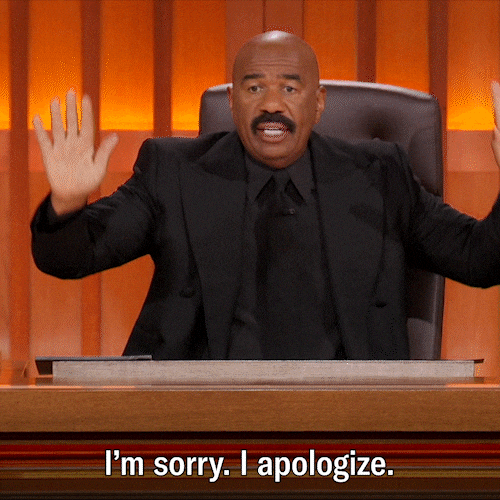 Giphy
GiphyIt’s kind of wild that when you work as a therapist/counselor/coach, a lot of people never really see you as human — and this can include your close relationships. What I mean by that is, it’s almost like they expect you to be free on-call therapy to the point where they “forget” to actually check on you sometimes.
Such is the case with one of my longest-running friendships. Even during the weeks between losing my mother and losing $4K (SMDH), she would just keep calling me to vent about her marriage. I finally got so fed up that I brought it to her attention that for the past couple of years, that is exactly what our friendship has been like: her venting, me listening without her being very invested in my life at all. In response, she texted me an apology — and boy, was it beautiful.
I’m not going to share the details of what she said; however, I am going to tell you three things that it consisted of because it’s what I believe ALL APOLOGIES should entail.
1. She took full ownership for what she believed that she did. I framed this point in this way because, something that everyone needs to forever keep in mind is the fact that two people start and, to a large extent, end relationships — and what I mean by that is, it’s never like one person was perfect and the other was the villain. That said, though, when someone is making an apology to another individual, they are going to own their part and articulate what that part is. It’s not gonna be a simple “My bad.”
It’s going to be “I am really sorry that I wasn’t there for you when you needed me” or “I apologize for taking you for granted” — something that sounds like they get the “offense” that transpired. By doing this, they recognize their missteps — and that is what puts people on the road to not repeating them.
2. She did not deflect or gaslight me. You know what one of the worst apologies are: It’s when someone says they are sorry and then follows it up with, “But you do it too” or “If you hadn’t done ‘A’, I wouldn’t have done ‘B.'” Justifying your actions is a surefire way to make someone believe that you don’t really think that you did something wrong (or that bad) in the first place. And really, how can they trust you (again) if that is how you feel? Oh, and don’t get me on gaslighting.
Ugh, ain’t nothing like someone claiming that they want to set things right with you, only to act like they don’t really get where you are coming from with the issues y’all were having in the first place. A good gaslight line in an apology: “If that is what you think happened, I apologize.” Yeah, you can keep that, jack. Never accept this kind of apology — because it isn’t one.
3. She addressed why she needed to make the apology in the first place. Wanna know one of the main reasons why I don’t trust people who don’t believe in having regrets (check out “Why Regret Might Not Always Be A Bad Thing”)? Did you know that apology means “a written or spoken expression of one's regret, remorse, or sorrow for having insulted, failed, injured, or wronged another.” How, as a human, do you think that you are out here not making any mistakes or poor decisions that you sometimes need to APOLOGIZE for? That is just…insane.
And one of the reasons why apologies are important is because if you feel bad about “failing” someone, it’s usually because you value them enough to want to keep them around. And yes, in my friend’s apology, she also explained why she didn’t want me to feel hurt in the way that she had hurt my feelings and what she would do to prevent that from happening in the first place.
So y’all, with all of this out of the way, before getting deeper into this topic? If an ex is hitting you up to apologize to you for something, please make sure that he hits all three marks of a true apology.
Now let’s keep going.
A Genuine Apology Should Also Include an Amends
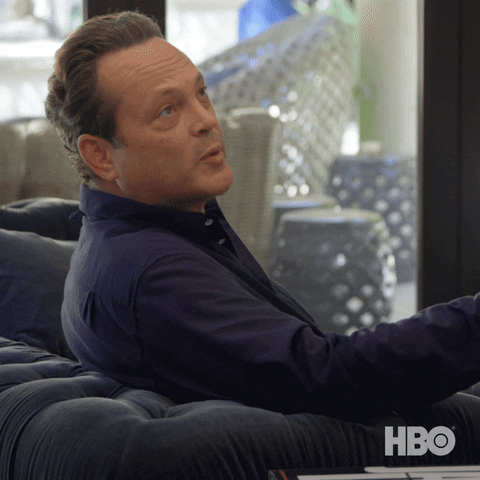 Giphy
GiphyA few years ago, I wrote an article for the platform entitled, “Heads Up: It's NOT An Apology If An Amends Isn't Made.” You know how I mentioned a second ago that a solid apology has no gaslighting in it? Hmph. Ain’t it wild how someone can do something that hurts or harms you and yet, they want you to just “hurry up and get over it”? GASLIGHTING.
Someone in my family, after unpacking years of abuse that I experienced at their hand, they had the nerve to say, “I’m not going to keep apologizing to you for this.” Hmm…Okay. So, how about you let me give you a consistent three months’ worth of the years of mistreatment that I experienced from you and then flippantly throw an apology your way. Let’s see how you feel about it. How much you believe that I am being genuine and sincere.
Listen — and please hear me GOOD on this: when someone really gets the magnitude of the pain or discomfort and inconvenience that they caused, they aren’t going to be fine with just saying that they are sorry for it; they are going to ask you what they can do to set things right.
It’s actually a part of the reason why I named the four children who I aborted (check out “Why I Named The Children I Aborted”) because I do have some real remorse for those decisions. Each of their names have an intentional meaning and I strive to leave out their purpose, through those names, on a daily basis. It’s a small way of making amends.
You know, back when my first book came out, my first love reached out, via email, to send me an apology. The apology hit most of the points that I mentioned earlier. Looking back, there wasn’t an offer to make an amends, though, and trust me, there was A LOT to make up for.
At the end of the day, amends means “reparation or compensation for a loss, damage, or injury of any kind; recompense” and while none of us should use bitterness, resentment or emotional stagnation as the “bar” for which we should expect amends to be made, if you’re trying to figure out just how sincere an ex is with their apology, if they want to do something to make things better, that’s a good sign.
There is a caveat, though.
Discern the Motives. Always.
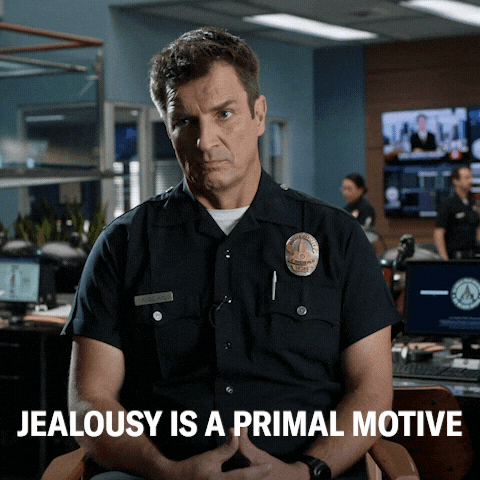 Giphy
GiphyEarlier this summer, I wrote an article for the platform entitled, “What's Your Motive For Sex? (It Reveals A Lot. Trust Me.)” Then, a few weeks ago, I wrote another article entitled, “As Cuffing Season Steadily Approaches, What The Heck Is 'Winter Coating'?” and boy, when I tell you that both of these complement this point really well? Goodness.
If you’ve never heard of the dating trend known as winter coating before, it’s basically when an ex creeps back up around cuffing season — and if you know what cuffing season is all about, you can absolutely connect the very probable motives behind those dots.
Now can there be exceptions? There are ALWAYS exceptions. Still, if you haven’t heard from your ex in years and here he comes a couple of weeks before Christmas, unless the two of you got together or broke up around the holidays, stay on potential “winter coating alert,” because it might not be about “building bridges” so much as getting into your bedroom.
That said, if it’s been a minute (six months or more) since you’ve heard from an ex and he suddenly reaches out to apologize, absolutely take out a moment to discern the motive — and shoot, feel fine with even asking what is causing him to make the move…now. If it’s in the spirit of the holidays and wanting to go into a new year with a clean slate, got it. If it’s because he’s been in therapy and realizes that he didn’t end certain things in his past very well, understood. If it’s because he didn’t like how the two of you broke up and he wants to try and make peace, that’s fair.
On the other hand, if you sense that he wants to rekindle something (check out “Nelly And Ashanti Are Giving It Another Shot? Here's What You Should Know About 'Ex Reconciliation'” and “I'm Thrilled That Ryan Destiny & Keith Powers Are Back Together. 5 Things Before Reuniting With Your Ex, Tho.” and “What Happens When 'The One Who Got Away'...Comes Back?”) — although that’s kind of another article for another time, do check that motive.
When someone apologizes, you should really be the only focus for them; not what they can get out of it on the back end. Listen, even if he hopes to get back with you (or back in bed with you), that shouldn’t be something that is discussed during the apology. If it is said or even implied, something about HIS MOTIVE is disingenuous. And if that is indeed the case, to a valid extent, so is he.
We All Should Give the Grace and Mercy That We Desire
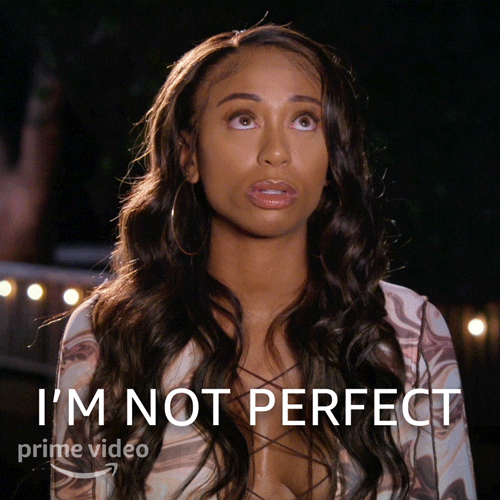 Giphy
GiphySooner than later, I’m going to write an article about forgiveness (beyond what I already have here). For now I’ll just say that if you are someone who thinks that other people don’t deserve forgiveness? That is either your pain or your ego talking and, either way, you can’t trust “their” judgment.
All of us mess up sometimes and if you are a karma (or you reap what you sow) believer, then you absolutely should want to extend others grace and mercy so that you can receive it in your own time of need (and you are absolutely delusional if you think a time won’t come, sooner than you probably think, that you will need it).
Besides, do you know all of the self-inflicted drama and trauma that comes from NOT forgiving others: higher blood pressure, insomnia, stress, anxiety, the higher risk of a heart attack, a weakened immunity, a greater risk for depression and anxiety — whatever he did, is it really worth all of this? Yeah, while a lot of people think that weaponizing forgiveness is empowering, really all it’s doing is putting themselves in harm’s way. Physically. Emotionally. SPIRITUALLY: “For if you forgive men their trespasses, your heavenly Father will also forgive you. But if you do not forgive men their trespasses, neither will your Father forgive your trespasses." (Matthew 6:14-15 — NKJV)
By the way, no one is saying that forgiving that man means that you have to allow him back into your life. After all, access is a privilege. Yet if he comes to you and acknowledges that he feels sorry for some things, for the sake of your own sanity, why not let him express it? Don’t wanna meet up or talk on the phone? Understood. Email and/or text are there for the taking. Don’t want to go back and forth? Who said that it needs to be a discussion or a debate?
All I know is, the more time you spend on this planet, the more you want to put out the energy that you want to come back. Forgiving others tends to make life easier. Not forgiving? Oh, the way that it boomerangs, sometimes in ways you never saw coming, chile. Dodge that kind of experience (and typically hard life lesson) if you can.
Yes, Better Late than Never
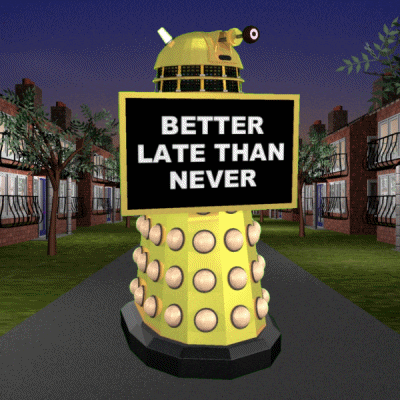 Giphy
GiphyToo late to apologize. Yeah, I don’t really know if there is such a thing (because forgiving and reconciling are not one in the same and some of y’all will catch that later). I’ll wrap this up with a story to prove my point.
Once upon a time, I knew a woman who was in a serious relationship and yet, whenever her boyfriend would bring up the possibility of marriage, she would stall him out. When I finally asked her what her deal was, she explained that she still harbored so much pain from the man before him that she didn’t fully trust that he was the real deal. About five months later, here came her ex with a thorough explanation for why he made some of the decisions that he did while they were together. Now that she had the full story, she was able to heal. She got married to her boyfriend that following year.
You see where I am going with this? Although your ex’s apology might be “late” as far as y’all’s relationship timeline, the timing may be BRILLIANT when it comes to true when and why you actually need it. Yeah, a Scripture that I adore is “Timing is the Father’s business” (Acts 1:7 — Message) and sometimes those apologies, in the grand scheme of things, are more on time than you could ever imagine; they’re when God deems you need them not when you want to have them.
____
It is Oprah Winfrey who once said, “True forgiveness is when you can say, "Thank you for that experience” and sis, if you remove the bitterness and anger and look deeper, there were valuable lessons, even in and from the most challenging relationships. And that is worth appreciating through forgiveness and, if need be, full and complete release.
Bottom line, should you accept an ex’s late apology? Absolutely.
What better way to illuminate your present on a whole ‘nother level.
Just as forgiveness always does.
TRUST ME.
Let’s make things inbox official! Sign up for the xoNecole newsletter for love, wellness, career, and exclusive content delivered straight to your inbox.
Featured image by Shutterstock


